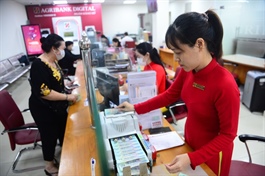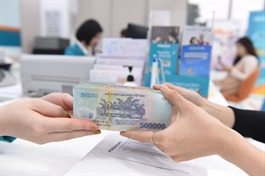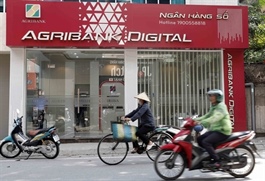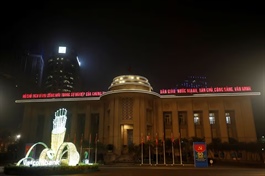Establishment of carbon credit exchange to safeguard Vietnam’s national interests
Establishment of carbon credit exchange to safeguard Vietnam’s national interests
The goal is to establish a transparent and publicly accountable carbon credit market based on determining total emissions and allocating emission quotas to regions, sectors, and even individual emitters.
Vietnam needs to proactively establish a carbon credit market now to align itself with countries and regions that have already implemented economic and financial tools to manage carbon emissions. This proactive approach will ensure appropriate responses and avoid losses or disadvantages for businesses, thus safeguarding national interests.
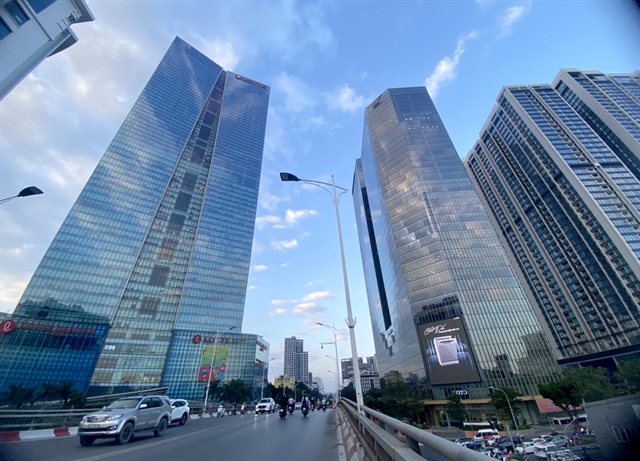
Overview of the meeting. Photo: Minh Khoi |
Deputy Prime Minister Tran Hong Ha stressed this view at a Government meeting on January 8 to discuss the prospects of carbon credit trading in Vietnam.
Ha emphasized that creating such an initiative is a practical implementation of the country’s commitment to achieve net-zero greenhouse gas emissions by using economic tools to manage corporate emissions.
“The goal is to establish a transparent and publicly accountable carbon credit market based on determining total emissions and allocating emission quotas to regions, sectors, and even individual emitters. Economic tools will be employed to influence perceptions and behaviors related to greenhouse gas emissions,” said Ha.
According to the Deputy Prime Minister, the effectiveness and real benefits of the carbon credit market can only be achieved through a globally applied, comprehensive, and fair approach.
However, to date, only a few countries and regions have started implementing economic tools to manage carbon emissions for certain products.
Sharing his view, Deputy Minister of Finance Le Tan Can noted that Vietnam's carbon credit market is tailored to the country's practical conditions and development direction, in line with international commitments to reduce greenhouse gas emissions and the global trend of developing carbon credit markets. It aims to maximize the use of domestic economic resources in participating in greenhouse gas reduction activities.
“It is crucial to ensure that the domestic carbon credit market operates fairly, transparently, openly, safely, efficiently, and in line with national conditions and international practices,” said Can, adding it should balance the interests of market participants, enhance the country's competitiveness in building a low-carbon economy, and promote sustainable development.
Can added that Vietnam's carbon credit market includes two types of commodities: greenhouse gas emission quotas and carbon credits confirmed by the Ministry of Natural Resources and Environment and traded on the domestic carbon credit market.
Market participants include entities in the designated sectors, emission sources required to report greenhouse gas emissions, organizations implementing carbon credit programs and projects, entities entitled to participate in carbon credit investment and trading activities under legal regulations, and organizations in support of related transactions.
Based on global practices where many countries have established carbon credit trading platforms, the Ministry of Finance proposes to create a similar model in Vietnam, Can said.

The carbon pricing makes greenhouse gas emissions more costly. Photo: Thanh Hai/The Hanoi Times |
The project's overall goal is to develop the carbon credit market in Vietnam, contributing to reducing greenhouse gas emissions at a low cost to businesses and society. This initiative aims to drive low-emission technology development, enhance the competitiveness of Vietnamese enterprises, and move towards a low-carbon economy while proactively addressing climate change.
Deputy Minister of Natural Resources and Environment Le Cong Thanh emphasized the key points in creating the carbon credit market, such as managing the creation of carbon credits, developing emission reduction plans by sector, and establishing mechanisms for international carbon credit trading.
Deputy Minister of Planning and Investment Nguyen Thi Bich Ngoc emphasized the need for allocating emission quotas as a basis for developing policy mechanisms to encourage businesses to innovate technologies and manage emission activities. Additionally, Vietnam's carbon credit market needs to be connected to the world in order to reassure foreign businesses to invest in production and business activities.
"The project needs to specify the market model and implementation roadmap, especially in drafting legal documents; assess comprehensive impacts on production sectors, international agreements, and commitments," Ngoc asserted.
A comprehensive approach to boost the carbon credit market
In conclusion, Deputy Prime Minister Tran Hong Ha emphasized that commitments to reduce greenhouse gas emissions are consistent viewpoints and policies of the Party and the State, considering climate change as the greatest challenge that requires a global approach. This is also an opportunity for Vietnam to transition to a development model suitable for the future.
"Vietnam fulfills its global responsibility for greenhouse gas emission reduction while protecting national interests in a fair, open, and transparent way," the Deputy Prime Minister noted.
Highlighting the leadership and constructive role of the State, the Deputy Prime Minister stressed the need to assess the impact of economic, financial, and fiscal instruments to ensure harmony between domestic and international aspects. Transparency in the responsibilities and rights of market participants in the emission quota and carbon credit trading markets is crucial, he noted.
Ha instructed the Ministry of Natural Resources and Environment to enhance the capacity for determining and allocating emission quotas for various sectors according to a specific and clear plan. The ministry should effectively enforce regulations and standards on statistical mechanisms, measurement, and certification of emission quotas, as well as carbon credits, according to international standards, particularly in the fields of transportation, electronics, and agriculture, among others.
The Ministry of Finance is required to mobilize the participation of representatives from relevant ministries and sectors, as well as a team of experts in greenhouse gas reduction, economics, finance, and international climate change law. This collaborative effort aims to thoroughly and comprehensively research the development of policies related to the carbon credit market in other countries. This includes emission quota allocation, operational models, economic and financial tools, and compliance with international standards.








